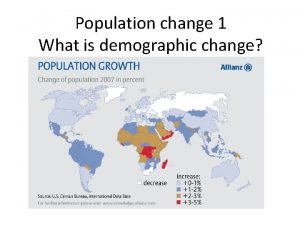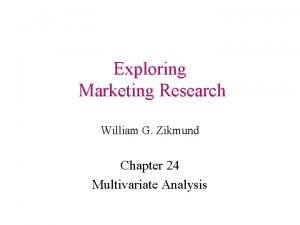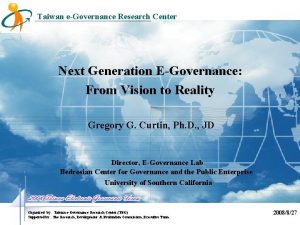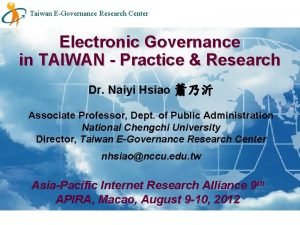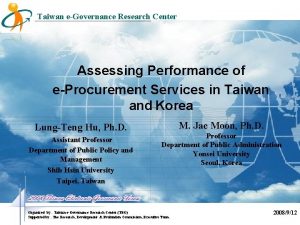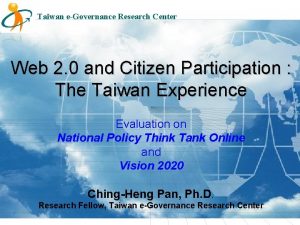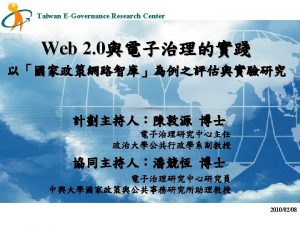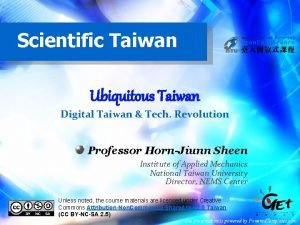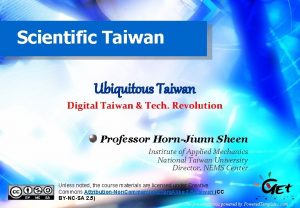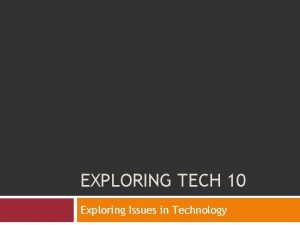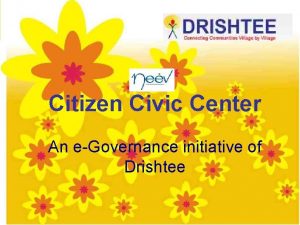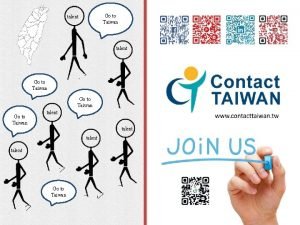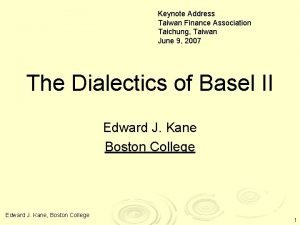Taiwan eGovernance Research Center Exploring the Prospects of

















- Slides: 17

Taiwan e-Governance Research Center • Exploring the Prospects of Online Forums Enhancing the Public Sphere: Case Study on Korea & Taiwan Kuan-Chiu Tseng and Seung-Yong Rho Assistant Professor, Department of Public Administration, Tam. Kang University Assistant Professor, Department of Public Administration, Seoul Women’s University 2008/8/27 Organized by : Taiwan e-Governance Research Center (TEG) Supported by : The Research, Development & Evaluation Commission, Executive Yuan.

Taiwan e-Governance Research Center Research Backgrounds • • There is a huge gap between representative democracy and the citizenry, a gap that is evidenced by declining voter turnout, decreased levels of civic participation, and widespread cynicism toward political institutions. Much has been said about the cure for the ills of democracy is to provide more opportunities for citizens to engage in the deliberative process of public affairs across a range of social and public issues. Information and communication technologies (ICTs) has greatly impacted the organizational preconditions of democratic governance in important ways. Fortunately, the Internet is rapidly becoming a part of the everyday lives of a majority of people in the world. People perform various activities on the Internet and one of them is discussing politics through online forums. 2

Taiwan e-Governance Research Center Research Question • • This paper attempts to conduct a study of the deliberative future of the Internet and examine the role of the Internet as a mechanism for democratic change by looking at online forum practice in Seoul and Taipei municipal government. We pose the question: can we consider current practice of online forum in two local governments as approaching to the ideal notion of the public sphere outlined by J. Habermas? 3

Taiwan e-Governance Research Center Deliberative Democracy • • • J. Habermas formulates an alternative notion of democratic politics by extracting the most attractive elements of the liberal and republican traditions in political theory and incorporating these elements into a communicative framework. Neither is democracy conceived of primarily as a mechanism for aggregation of pre-political, private interests, nor is it seen as a process of public discussion in which the members of a community discover substantive common interests. Deliberative democrats argue that democracy is viewed as a process of social learning through rational argumentation. Thus, a ‘strong’ model of democracy requires a public sphere of rational-critical discourse. 4

Taiwan e-Governance Research Center Online Deliberation • Much has been said about the possibility of the Internet enhancing democracy. – Dahl (1989: 339) argues that ”telecommunications can give every citizen the opportunity to place questions of their own on the public agenda and participate in discussions with experts, policy makers, and fellow citizens. ” • Scholars also suggest that online practice is discursive contexts that do not necessarily promote qualitative forms of deliberation. – Wiklund (2005) contends that “correctly designed ICT-enabled services have a deliberative democratic potential, but this does not overshadow the fact that the services existing today only to a limited extent support processes of social learning through rational argumentation. ” – Wilhelm (1999: 98) observed that the discursive dynamic was characterized by “the self-expression of monologue, without in large measure the listening, responsiveness, and dialogue that would promote communicative actions”. 5

Taiwan e-Governance Research Center Content Analysis • • Previous research has employed the method of content analysis in a variety of ways in order to study people’s online practice. Several authors has developed an instrument to measure the extent to which online forums have corresponded with the conditions of an idealized public sphere. Researchers, however, have no consensus on the selection of criteria that constitute the notion. Our definition of public sphere refers to when participants consider that their participation will be read and replied by others online and can have political influences to some degree (i. e. the number of browsers). This paper turns to preliminarily figure out the configuration of online practice by collecting and analyzing the related data, i. e. the number of messages, the number of comments, the number of participants and the interaction of participants in a given period. 6

Taiwan e-Governance Research Center Online Deliberation in Korea • I need your help ~ 7

Taiwan e-Governance Research Center Online Deliberation in Taiwan • Taipei Municipal Government's citizen forum – In 1999, the Taipei Municipal Government established online discussion forum to provide citizens with policy discussion opportunities. – An application through which citizens can input opinions, consider the opinion of others’ and exchange arguments. – Key rules of the online forum as below • Right to post and respond • Keep topics within forum purpose • Personal attacks, hateful speech, etc. , directed at participants are forbidden. • Commercial advertising is not allowed. 8

Taiwan e-Governance Research Center Online Deliberation in Taiwan • Taipei Municipal Government's citizen forum Title Deliberation Period Number of Comments Number of Browsers Municipal administration Aug 18, 2006 -Aug 28, 2008 5445 535084 Taxation services Nov 16, 2006 -Aug 28, 2008 196 119235 9

Taiwan e-Governance Research Center Online Deliberation in Taiwan • Forum on taxation services: monthly statistics, 2007 -2008 Period Number of Topics Number of Comments Number of Browsers Nov 2007 3 6 10398 Dec 2007 5 15 16138 Jan 2008 11 19 18377 Feb 2008 6 10 6693 Mar 2008 11 18 16457 Apr 2008 13 24 16709 May 2008 24 42 19754 Jun 2008 19 42 15397 Jul 2008 6 12 4209 Aug 2008 4 8 1775 10

Taiwan e-Governance Research Center Online Deliberation in Taiwan • Forum on municipal administration: daily statistics, 2008 Date Number of Topics Deliberation Period Number of Comments Number of Browsers Aug 11 0 Aug 12 1 Aug 12 -Aug 20, 2008 58 894 Aug 13 1 Aug 13 -Aug 13, 2008 0 155 Aug 14 3 Aug 14 -Aug 14, 2008 Aug 14 -Aug 30, 2008 Aug 14 -Aug 28, 2008 0 3 11 105 242 550 Aug 15 0 Aug 16 1 Aug 16 -Aug 29, 2008 13 596 Aug 17 0 Aug 18 1 Aug 18 -Aug 20, 2008 1 280 Aug 19 2 Aug 19 -Aug 20, 2008 Aug 19 -Aug 22, 2008 2 2 177 340 5 Aug 20 -Aug 26, 2008 Aug 20 -Aug 20, 2008 Aug 20 -Aug 27, 2008 Aug 20 -Aug 21, 2008 11 Aug 20 -Aug 29, 2008 5 1 4 3 62 264 273 313 176 853 Aug 20

Taiwan e-Governance Research Center Online Deliberation in Taiwan • The amount of messages posted on the forum from Aug 1, 2008 to Aug 31, 2008 No. Author’s name Amount of messages posted on the forum Weight on total comment amount 1 ftk 271 59. 43 % 2 bot 30 6. 58 % 3 bow 22 4. 82 % 4 und 14 3. 07 % 5 clo 12 2. 63 % 6 edc 11 2. 41 % 7 fan 10 2. 19 % 8 wsb 7 1. 54 % 9 Gom 5 1. 10 % 10 others (comments less than 5)* 74 16. 23 % Total 50 456 100 % * Note: the colum "others" include 41 authors. 12

Taiwan e-Governance Research Center Online Deliberation in Taiwan • The amount of messages posted on the forum from Jul 1, 2008 to Jul 31, 2008 No. Author’s name Amount of messages posted on the forum Weight on total comment amount 1 ftk 232 66. 86 % 2 bot, lov 19 10. 95 % 3 und 8 2. 31 % 4 bow 7 2. 02 % 5 others (comments less than 5)* 62 17. 86 % Total 51 347 100 % * Note: the colum "others" include 46 authors. 13

Taiwan e-Governance Research Center Online Deliberation in Taiwan • Pattern of online deliberation on “Topic 1” #11#12#13 #14#15#16 #17#18 Participant 7 (fan): #1 #5 opening statement by Participant 1 (psa) #10 Participant 6 (sus): #6 Participant 5 (ftk): #8 #9 #7 #4 Participant 4 (clo): #19 #2 #3 Participant 3 (bow) : Participant 2 (bot): 14 #1 --2008 -08 -07 17: 58: 20 #2 --2008 -08 -08 10: 22: 47 #3 --2008 -08 -08 12: 11: 56 #4 --2008 -08 -10 10: 58: 17 #5 --2008 -08 -11 20: 18: 00 #6 --2008 -08 -12 08: 10: 38 #7 --2008 -08 -14 09: 43: 58 #8 --2008 -08 -15 08: 29: 31 #9 --2008 -08 -15 08: 35: 38 #10 --2008 -08 -23 07: 57: 32 #11 --2008 -08 -23 19: 10: 41 #12 --2008 -08 -23 19: 13: 41 #13 --2008 -08 -23 19: 15: 39 #14 --2008 -08 -23 19: 16: 53 #15 --2008 -08 -23 19: 17: 30 #16 --2008 -08 -23 19: 18: 05 #17 --2008 -08 -23 19: 18: 53 #18 --2008 -08 -23 19: 30 #19 --2008 -08 -25 02: 15: 12

Taiwan e-Governance Research Center Online Deliberation in Taiwan • #1 --2008 -07 -08 #2 --2008 -07 -10 #3 --2008 -07 -10 #4 --2008 -07 -14 #5 --2008 -07 -14 #6 --2008 -07 -15 #7 --2008 -07 -17 Pattern of online deliberation on “Topic 2” Participant 5 (ftk): #7 #1 opening statement by Participant 1 (agl) #6 Participant 4 (pto): #5 #4 #3 Participant 3 (bot): #2 Participant 2 (eat): 15 14: 56 11: 55 15: 25 18: 06 18: 18 08: 50 23: 21

Taiwan e-Governance Research Center Findings and Implications • • First, regarding the current performance of the forum, it is clear that digital deliberative democracy is happening in both governments. But they all face the similar challenges of lacking substantial participation by citizens. Second, regarding the potential of Internet technology, while it will continue to harbour a diversity of opinion and controversy, the Web is more likely to remain a vehicle for those already interested in politics. Third, regarding the policies of digital participation, public administrators, before deciding to carry out best practices, should perceive the fact that it is offline social embededness that prevent the expansion of online deliberation. Fourth, regarding methodological issues, it would be clear that a more robust findings on deliberative quality of the online forum need to be complemented by a qualitative analysis. 16

Taiwan e-Governance Research Center Conclusion “the application of new technologies within societies dominated by commercial and individualist values and ‘thin’ models of democratic participation will more than likely ‘produce the same uncivility and cynicism that characterize politics in the older technologies, radio and television, for example. . If the technology is to make a political difference, it is the politics that will first have to change’. There must be ‘a will toward a more participatory and robust civic society’. (Barber, 1998: 261 -263, quoted from Dahlberg, 2001: 630 ). 17
 The remark of the greek epigrammatist
The remark of the greek epigrammatist Quantum computing progress and prospects
Quantum computing progress and prospects Prospects of agriculture in bangladesh
Prospects of agriculture in bangladesh World population prospects
World population prospects Prospects preposition
Prospects preposition Exploring marketing research
Exploring marketing research Exploring marketing research
Exploring marketing research Hát kết hợp bộ gõ cơ thể
Hát kết hợp bộ gõ cơ thể Bổ thể
Bổ thể Tỉ lệ cơ thể trẻ em
Tỉ lệ cơ thể trẻ em Gấu đi như thế nào
Gấu đi như thế nào Tư thế worm breton là gì
Tư thế worm breton là gì Chúa yêu trần thế alleluia
Chúa yêu trần thế alleluia Các môn thể thao bắt đầu bằng tiếng nhảy
Các môn thể thao bắt đầu bằng tiếng nhảy Thế nào là hệ số cao nhất
Thế nào là hệ số cao nhất Các châu lục và đại dương trên thế giới
Các châu lục và đại dương trên thế giới Công của trọng lực
Công của trọng lực



